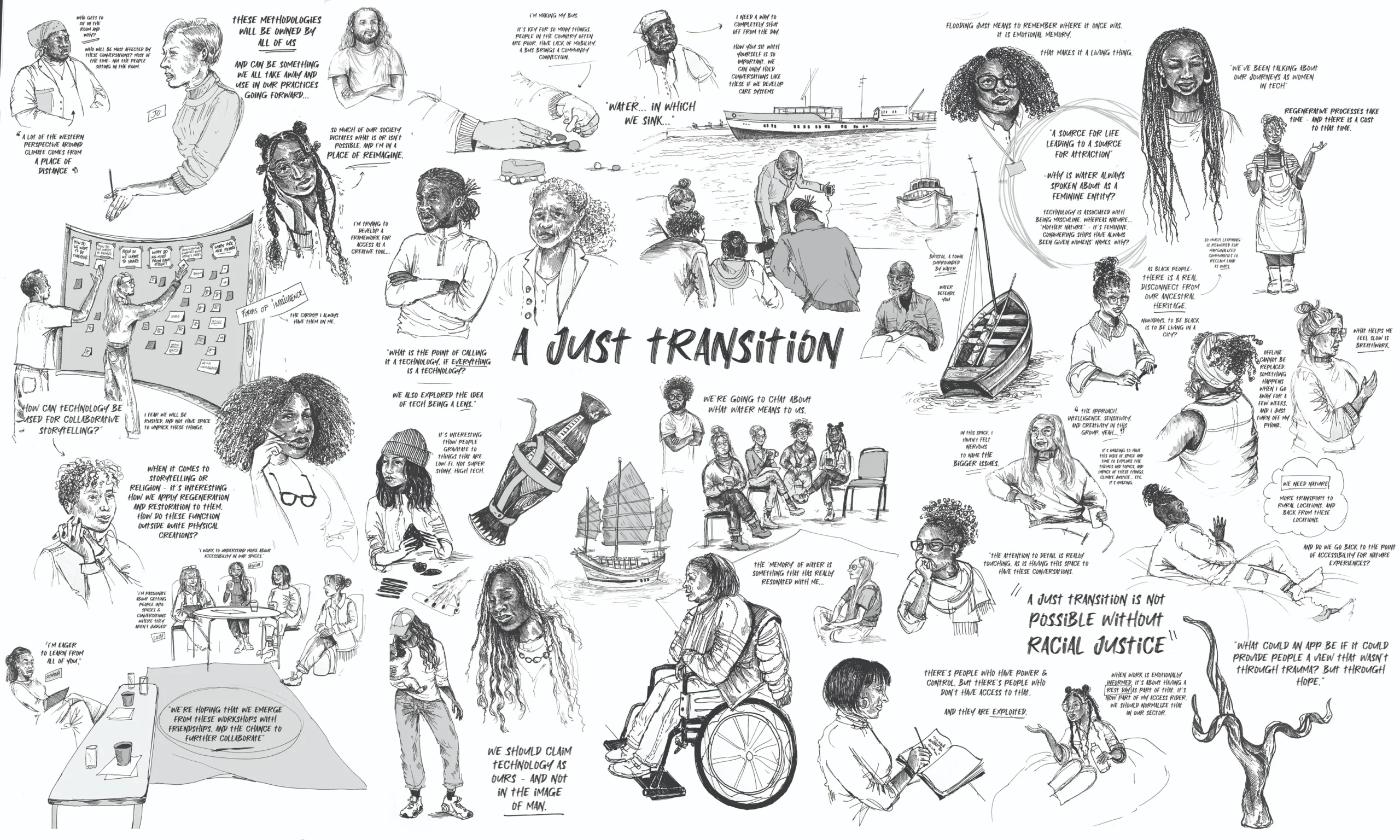
ALTERNATIVE TECHNOLOGIES:
A JUST TRANSITION
INTRODUCTION
Alternative Technologies: A Just Transition was a co-produced enquiry between Pervasive Media Studio and the Digital Cultures Research Centre (DCRC), which sought to integrate our previous work looking at responsible and inclusive innovation and a creative just transition into a new climate action wayfinding methodology. This enquiry centred voices of marginalised individuals within our shared studio community. Guided facilitation was used to support community-led conversations on the intersection of creative technology and climate and to interrogate our position as advocates within this transdisciplinary sector.



WHAT IS A TECHNOLOGY
The climate crisis is a crisis of culture. It is not just an apolitical environmental issue, but a result of a society that prioritises individualism and disconnection from one another and the earth. This crisis will not impact everyone equally; it will disproportionately harm those who have contributed the least to it, worsening the lives of already marginalised communities.
Technology plays a crucial role in this crisis. It can alienate, exploit, but also connect, and regenerate. At the heart of the problem is a world where technological development is driven by wealth and power accumulation, synonymous with high tech products, and a field where only ‘experts’ can innovate.
We began by questioning the concept of technology itself, examining who designs, profits from, implements, and uses it. This approach challenges the notion of the “expert,” breaking down the association of technology with “big tech,” and we collectively opened space to for us redefine the parameters of what technology is and can be.

NARRATIVES OF WATER
A Just Transition must be local because the impacts of the climate crisis are felt most acutely at the community level, and local communities have the best understanding of their unique challenges and resources. By focusing on local expertise and leadership, especially from marginalised groups who are often most affected by climate change, we create futures that are more effective and equitable. For us, this meant thinking about where we sat – ie Bristol and harbourside-based– linking our work to global histories and realities; also, acknowledging that the city of Bristol was involved in the transatlantic slavetrade.
Our surroundings became prompts for us to think about our complex histories and current realities. The nearby body of water ensured nature was always present, but also provided an example of something that is both extractive and regenerative (much like technology) due to its complicity as a medium for slave trade and its simultaneous potential as a continuous source of life.
Ralph Hoyt– a Bristol-based poet, writer, and located audio designer- delivered a session grounding us in an awareness of our location; Bristol harbourside. Ralph’s bespoke, deeply emotional and educative performance which incorporated call-and-response had an unanimously moving effect on the whole group. Ralph also led an activity using hydrophones, during which participants had the opportunity to listen to sounds from under the water in the harbourside.
THE FUTURE
Imagining a future together is hard, especially for those who expend so much energy trying to survive and even thrive in the present. But there are many possibilities, many alternatives, many ways to forge ahead with a shared feeling and diverse, harmonious intentions and skills. We continue this way-finding mission for a future that is plural, complex and shared. With new tools and processes that reflect the values of the world we want to build, we can collaboratively shift how we define, create, and use technology.
Alternative Technologies: A Just Transition is already having an impact on our internal ways of thinking and doing in Pervasive Media Studio, DCRC, and Watershed as a whole. In addition to proactively joining up our thinking and exchanging knowledge on best practice within and amongst our colleagues, we expect our findings, community, and praxis to continue to be foundational to our future work.

THANKS
Alternative Technologies: A Just Transition was co-produced by: Furaha Asani, Zoe Rasbash, Erinma Ochu, Melissa Blackburn, Amy Densley, Lawottim Anywar, Tony Bhajam, Martin O’Leary, and Jo Lansdowne. Thank you to the whole delivery team.
With special thanks to Dr. Erinma Ochu for believing in and setting the framework to resource this enquiry, and the Natural Environment Research Council (NERC) and Engaging Environments programme for funding it.
We are also very grateful to Joyce Ternenge (University of Reading), Matt Burrows (University of Reading), Hilary Geoghegan (University of Reading), Cindy Regalado (Tekiu Ltd) and Hannah King (UKRI). They believed in what we wanted to do and helped get the funding out the door.
Thank you to all the participants for co-creating this work and for their generous sharings in the workshops. The Alternative Technologies: A Just Transition participants are: Alisha Morenike Fisher, Allie Joy, Beloved Sara Zaltash, Emmanuella Blake-Morsi, Fozia Ismail, Ifẹ Grillo, Imwen Eke, Jackie Head, Kai Charles, Kexin Liu, Lucy Reeves Khan, Natalie Hyacinth, Olamiposi Ayorinde, Roxana Vilk, Tay Aziz.
Thank you to Jazz Thompson for beautiful live scribing, which has formed the basis of this Zine.
We are also grateful to Jazlyn Pinckney for holding wonderful decompression spaces, Ralph Hoyte for such an inspirational session, and Houria CIC for delicious catering.
A very BIG thank you to Prince Taylor for creating this beautiful multimedia zine.
Read the full report here: Alternative Technologies: A Just Transition







